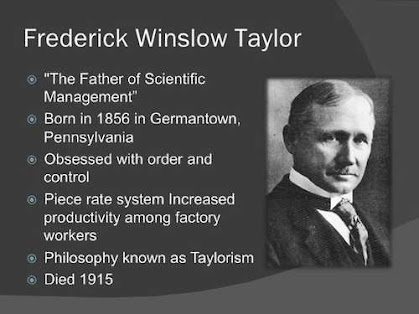How can “Taylorism” contribute to present organizations?
With increasing globalization, technological advancements, automation the organizations are hostile to sustain and grow amidst cut-throat competitions. Productivity improvement is one of the key value drivers for any organization.
One of the topics discussed widely in the modern world is the potential future threat to the human workforce as a result of increasing automation and technology. The machines are becoming a direct competition to the skilled workforce.
Scientific Management was introduced by Frederick Winslow Taylor in 1909, which originated the way of the scientific method of increasing efficiency and productivity by studying in detail a process to do it in the most efficient method by breaking tasks down to individual motions and monitoring the time (Taylor, 1919).
Figure 1: F.W. Taylor (Source: Gradeup, 2020)
Beyond numerous criticisms around Taylorism in the modern world due to lack of human elements consideration, it can be seen some of the organizations not only in manufacturing but even in service sectors such as IT and Call-centers practice the concept in the present world.
Taylorism at Amazon
An article published on ‘Digital Trend’ points out that the concept can be used in technology to help the human workforce do the jobs more efficiently and it is believed that giant companies like Amazon already using this in their warehouses for fulfillment associate staff to identify where individual products are located and quickest way to get there through a handheld device algorithm which monitors how fast employees complete individual orders (Luke, 2017).
Taylorism and Emerging HRM
The resource-based view of HR shows that employees can become a competitive advantage and is an important component of an organization and it is vital to consider the human factor into the process and merging best-fit HRM practices and implementing strategies to motivate and develop employees and increased consideration of employee well-being which will pave the way to protect human workforce with increased job satisfaction at the same time success of the organization. Armstrong (2014) suggests that the Employer's responsibility is to create a good working environment as a part of a total social reward system which will, in turn, increase the likelihood of employee commitments and establish the ‘best place to work’.
Conclusion
The concept of Scientific Management or “Taylorism” is inevitably one of the best approaches to increase productivity and it can provide Organizations a competitive edge in terms of cost and efficiency but in the modern world, the success and failure of the process largely depend on how best the modern HR practices and employee well-being fitted into the process to treat employees as human and Human Resources are not only an asset but also the most important asset for any organization.
References
Anupam Kawde, 2020. Gradeup. [Online]
Available at: https://gradeup.co/frederick-taylors-scientific-management-i
[Accessed 12 July 2021].
Armstrong,
M., 2014. Armstrong’s Handbook of Human Resource Management. 13th ed.
London: Kogan Page.
Luke
Dormehl, 2017. Digital Trends. [Online]
Available at: https://www.digitaltrends.com/cool-tech/ai-taylorism-workforce/
[Accessed 07 July 2021].
Schein,
Andrew, 2017. Taylorism and Amazon: Scientific Management at the World's most successful Retail Company. Italy, EuroMed Press.
Taylor, F.
W., 1919. The Principles of Scientific Management. New York and
London: Harper & Brothers Publishers.
Weyeneth,
J., 2019. Taylorism. [Online Video]
Available at: https://www.youtube.com/watch?v=-8ZeAlna67Q
[Accessed 20 July 2021].




Excellent stuff Fayaz!! Very practically and simply explained your opinion. Taylor's philosophy, theory 'Taylorism' published in early 19s but Taylor’s methods for improving worker productivity can still be seen today at companies. Through your post you have justified it nicely with real world example..
ReplyDeleteThanks for sharing
Thank you for the feedback Umesh,
DeleteTaylor's philosophy focused on the belief that making people work as hard as they could was not as efficient as optimizing the way the work was done. Scientific management provides many advantages to a nation in the form industrial peace and harmony, increased production and lesser cost of production, higher standard of living for every section of society, higher national income, rapid industrial development etc. Taylorism led to productivity increases, meaning fewer workers or working hours were needed to produce the same amount of goods. In the long term, most economists consider productivity increases as a benefit to the economy overall, and necessary to improve the standard of living for consumers in general. In here you have explained ans argued that how theory is benificial to the modern organinzational structure. Your argument is evidenced and acceptable. However, we observe some comparative disadvantages in this theory too. Thank you for sharing this artical.
ReplyDeleteThank you Oshadha for feedback and sharing your view and knowledge,
DeleteYou are correct the authentic Taylorism has some comparative disadvantages specially with human elements when it was initially introduced and practiced in late 18th and early 19th Centuries.
In modern world, the Organizations could utilize the concept for improved productivity but it is important to have a proper blend of HR Practices and employee-well being to gain overall positive performances.
Well explained all the concerns Fayaz. Taylor’s theories were clearly influenced the development of scientific management theories during the last two decades of 20th century under the name of corporate reengineering. Even though, he was criticized for introducing conflicts, boredom and negligence towards workers at the workplace his findings brought a revolution in shaping the factory system. Thank you for sharing.
ReplyDeleteThank you for the comments Rukmali, you are so correct that Taylor was heavily criticized for not considering human emotional aspects much but his theory made a revolution.
DeleteGreat explanation given with the example of Amazon is a clear evidence of your arguement. Thank you so much for sharing a fabulous infomation.
ReplyDeleteMost importantly need to be discuss the Tailors four principles of Scientific Managment. These principles are also known simply as "Taylorism".
1. Replace working by "rule of thumb," or simple habit and common sense, and instead use the scientific method to study work and determine the most efficient way to perform specific tasks.
2. Rather than simply assign workers to just any job, match workers to their jobs based on capability and motivation, and train them to work at maximum efficiency.
3. Monitor worker performance, and provide instructions and supervision to ensure that they're using the most efficient ways of working.
4. Allocate the work between managers and workers so that the managers spend their time planning and training, allowing the workers to perform their tasks efficiently.
"Taylorism has four underpinning principles, namely: to find the one ‘best way’ to perform each task, to carefully match each worker to each task, to closely supervise workers, and use reward and punishment as motivators, and finally to manage, plan and control". (Walonick 1993).
Thank you very much adding more value, as you correctly mentioned, Taylor not only provided a revolutionary theory that shaped factory system like Rukmali mentioned above, but also he provided 4 methodical guidelines as principles to make it more effective and to gain maximum benefit.
DeleteFayaz, greatly discussed about the concept of Scientific Management or “Taylorism” and it’s benefit to the organization and developments.
ReplyDeleteScientific management puts the focus on efficiency and productivity. Jobs are specialized and new employees can be trained quickly. This approach is still in use in modern organizations.
The criticism of the approach is it reduces worker creativity and it requires management to monitor all aspects of employee behavior and it is unforgiving to workers who don’t meet the standard.
Open a stage to debate about efficiency and outcomes of modern HR theories vs Organization goal achievement.
Thank you very much for the comments Sunith.
DeleteWhen comes to Scientific Management as you discussed Taylorism is used by many organizations and businesses even on today, as it helps to improve productivity. Even from the examples taken the theory is conveyed nicely and simply.
ReplyDeleteSo I agree with you on your view towards Taylorism.
Thank you very much for the comments Dhanushika, I agree that the concept is used in many organizations and businesses even today.
Delete
ReplyDeleteIn terms of Business interest of organization, scientific management is indeed provide great tools for workers to enhance their output and efficiency, If management and HR can treat employees as humans and always listen to their grievance and motivate employees financial and otherwise . Then Taylorism will survive for another many more years and the theory will helps the productivity of the world economy . Fayaz you have done an amazing job . All the best
Thank you very much Tharindu for your comments and it is true that in the current global context human resources must be factored for future success of the theory.
DeleteGood explanation Fayaz, Taylor’s Scientific Management is still common within the modern day workplaces even in Sri Lanka. Such as garment factories, the work environments we go to everyday, the hospitals and some of the restaurants etc., almost all of them function more efficiently due to the application of Scientific Management.
ReplyDeleteThank you very much Nadun for your comments, Yes I agree, the concept is widely seen in many operations, especially in factories and technological environment.
DeleteGreat Article Fayaz ! Indeed as mentioned Taylor’s Scientific Management was an extremely important theory that revolutionized the field of management and helped to increase the productivity & efficiency of many organizations, it was great that Amazon was taken as a example main because of the sheer size & volume of company proving the positives of this theory, overall great explanation.
ReplyDeleteThank you so much for the comments Jude.
DeleteGood explanation Fayaz. Most of the manufacturing companies still use Taylor's Scientific Management to increase the productivity. As you mentioned, it shows how Amazon use the technology to increase the productivity of their employees. But we forget one side of it, Multiskilling of employees.
ReplyDeleteGood topic Fayaz,Taylorism still works as it has always been. It also has very beneficial results. The concept of Taylorism is very important because it lays the foundation for current knowledge which is why you will not complete the foundation of doctrine, so we need to expand the line of reasoning to adapt to change and the test of time.
ReplyDeleteTaylor's Scientific Management Theory principles have created teamwork. Taylorism breaks tasks down into tiny steps and focuses on how each person can do their specific series of steps best. Modern methodologies prefer to evaluate work systems holistically to maximize productivity. Taylorism's extreme specialization runs counter to modern workplace ideals of motivation and satisfaction. You have nicely justified it with real-world examples like Amazon in your post.
ReplyDelete